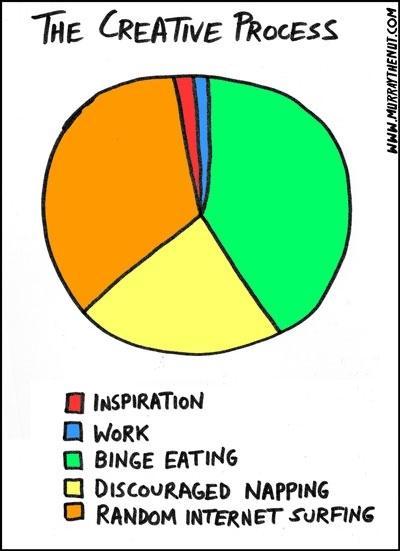Topics:
Content MarketingSubscribe now and get the latest podcast releases delivered straight to your inbox.
In the words of modern day philosopher Samuel L. Jackson, "Hold onto your butts."
I spent the vast majority of yesterday afternoon wading through a sea of terrible content, and it's put me in a bit of a mood.
Even though industry leaders are screaming at the top of their lungs that mediocre content doesn't cut it anymore, many organizations are still churning out junk for a variety of reasons. Lack of time, lack of caring, lack of perspective, etc.
So, while I had originally intended today's article to be about creating sustainable content organizations, I'm tabling that for now, because it's time for me to stop being nice and start being real about the quality of what some of you are producing.
Specifically, we're going to talk about the three sins you may be committing with your content and how to turn your content ship around.
First, You're Boring
I know topics like insurance coverage gaps, HIPAA compliance, or the benefits of outsourced IT partnerships don't exactly scream excitement and intrigue. (We can't all be fun like ThinkGeek.)
But that doesn't give you permission to bore me to death with recycled, tired content that would be just as at home in a stale Wikipedia entry as it is on your blog.
Boring content tends to take two forms:
First, robotic "analysis" content, where the author considers expressing any sort of opinion to be a sin. Second, content where it's pretty clear little to no thought or effort went into the strategy behind what is being published.

"Oh, look. Another 101-level blog post telling me what I already know."
I believe there are two main reasons why companies -- and the well-meaning marketers who write for them -- fall into this trap:
They're afraid, or they're lazy. End of list.
The Fear Trap
Fear is a powerful, detracting motivator in the writing world.
For example, in addition to burning the midnight oil here as a content strategist, I also write a column for our local paper on beer.
Each week, when my article goes to press, I become a slave to the relentless pendulum swing between feeling confident and inspired, and utterly self-loathing and inadequate.

Robert DeNiro captured this feeling quite well when he said:
“The mind of a writer can be a truly terrifying thing. Isolated, neurotic, caffeine-addled, crippled by procrastination, consumed by feelings of panic, self-loathing, and soul-crushing inadequacy. And that’s on a good day.”
Preach it, Bobby D.
Business writing, on the other hand, takes this neurosis to a new level. Each time you hit "publish," it's not just about you -- you're putting your brand's reputation on the line.
Will I turn off a prospect by being "too out there" or "too controversial"?
Will calling out a competitor on their shortcomings seem petty?
Will my audience come after me with pitchforks because I had the audacity to say what everyone else is thinking but never addresses?
Sadly, this level of caution has backfired, and we now live in a world where so many would rather play it safe with their content than say anything of substance or take risks.
They dress up content that doesn't contribute anything new to the conversation with a scandal-free, second-person narrative topcoat that won't get anyone in trouble.
I'm frustrated by this, because a lot of you guys are talking a big game about wanting to be a thought leader in your chosen industry -- either individually or as a collective brand -- but you aren't walking the walk by being honest in your content.
You are hiding behind sterile words and ideas that, quite frankly, could have come from anywhere.
If this sounds like you, I am challenging you to try something new.
For example:
- Hate something? Say something.
- Tell personal stories.
- Dole out some tough love.
- Share your successes.
- Talk about lessons that have helped you grow.
- Express an honest-to-God opinion for once.
I don't know about you, but that's the kind of writing that resonates with me -- when someone is getting to the meat of a concept or cutting through noise we're used to dealing with in this increasingly crowded world of business blogging.
If You're Just Lazy...
Now, for those of you who fall into the lazy category, I will keep it simple.
You're only hurting yourself. Lazy content is easy to spot, and it's not effective. Your content has to be consistent, of high quality, and engaging if you want to see results. Period.
If you're not going to commit to content, you're wasting your time. Either change your ways or move on.
Second, You're Not Giving Me Something to Do
Whenever I go to Google, it's because I want to learn something. Sometimes it's something silly like, "Why are sloths tired all the time?"
But other times, it's something important for work, like best cyber security marketing strategies.
Regardless of the circumstances, if I am reading your post with the intent of learning something, that means I expect come away with the ability to take immediate action in some way.
I want to hear about a new app. I want new insights that will help me make a more informed decision. I want to know what I'm doing wrong or could be doing better.
Maybe there's still a larger decision or action looming in the distance, but I still need to be able to do something, anything right now.
Every time you sit down to write, this is what you need to keep in mind.
If your readers come to the end of a blog post and feel like you've just spit out a bunch of facts they already knew, they will consider you and your business blog a complete waste of time.
To them, you're not an expert; you're Captain Obvious.
Solving for this is simple: put some mental elbow-grease into your writing.
If you've done a good job of picking compelling topics that your target audience really wants to learn about, reward them by giving something to work with.
Tease them with your expertise by arming them with actionable knowledge they can use today.
And Finally, You Abuse the English Language
Or maybe it's that you just don't care about proper spelling and grammar? Whatever. It doesn't matter what your reasons are.
It's true that embracing your flaws can be effective, but businesses that habitually fail in the grammar and spelling department are like those drunk people at a party with "a great personality." You might make me laugh once or twice, but I'm definitely giving you a fake number and never talking to you again.
It completely boggles my mind how many businesses are perfectly content to blow off basic writing standards, when one of the quickest ways to erode consumer confidence is to look careless in your writing.

"You think YOUR a good business owner?" I hate you. I hate you so much.
How are you supposed to establish your reputation as a professional, detail-oriented organization if you demonstrate that you can't be bothered to take two minutes to proofread something you're putting out there for the whole world to see?
So, if you have a heart, as well as a blog for your business, I am begging you to stop abusing our poor, defenseless language for one second and just hit the spell check button.
Or at least put some editing processes in place before you publish something for public consumption.
You're Better Than This
I'd like to think that we've all learned a lot together today. Yes, I know I was a bit harsh at times, but it's only because I care.
You are better than the one-dimensional content you're pushing out.
So, here's my assignment for you. Take five minutes today -- or the next time you sit down to write something -- and answer the following questions:
- "Am I boring my readers?"
- "Am I squandering opportunities to teach them something new?"
- "Do I toss commas around like confetti?"
The sooner you can answer those questions honestly, the sooner you'll start producing content that actually makes a difference for your marketing strategy.


Order Your Copy of Marcus Sheridan's New Book — Endless Customers!

